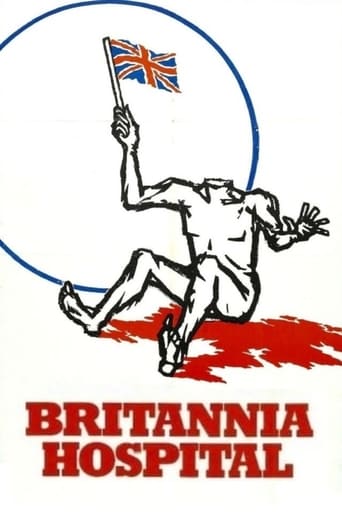tieman64
This is a brief review of "If", "This Sporting Life", "Britannia Hospital" and "O, Lucky Man!", four films by director Lindsay Anderson.One of the defining films of the British New Wave, "Sporting Life" revolves around Frank Machin (Richard Harris), a short tempered guy who becomes a star on the rugby circuit. Eschewing the style of Anderson's later films, which tended to be stylised satires, it offers a gritty portrait of a Northern England rife with failed relationships, class anxiety and human despair. As Anderson cut his teeth as a run-and-gun documentary filmmaker, the film crackles with the energy of post-war neorealism."This Sporting Life" would prove a big influence on Martin Scorsese's "Raging Bull". Replace Scorsese's boxing scenes with Anderson's urgent rugby brawls and swap the tough-but-dim Jake LaMotta for the equally tough-but-dim Frank Machin, and you have virtually the same tale. Both also make extensive use of flashbacks, are shot in black and white, are preoccupied with masculinity and personal anguish, feature violent romances, mix poeticism with realism, follow the same narrative progression and are about men who express their inner turmoil through external violence.Where "Bull" differs from "Life" is in the former's refusal to put Jake within a larger social context. This is a direct result of a broader shift; from modernism to post-modernism, from art as social engine to art as social withdrawal. In Scorsese's film, Jake LaMotta essentially has no external motivation. When at the end of the film LaMotta strikes a wall and yells "Why? Why?", Scorsese is equally clueless. "I didn't want to give LaMotta any motivations," Scorsese would say in interviews (not quite true; LaMotta is reduced to a Catholic body bag, a suffering Christ who exists to absorb penance for his earthly sins), before going on to state that "all motivations are cliché". "Reasons? We never discussed reasons!" he would tell the New York Times in 1980. Scorsese's dismissal, the unconscious stance of post-modernity, is chilling.But "understanding" is not necessarily "cliche", rather it is the essential component of character. La Motta's boiling anger in Scorsese's film does not make him a human being, especially once you've read how articulate and self-analysing LaMotta is in his autobiography. That makes the film, for all its power, somewhat shallow. Compare this to "Life", which has more direct and urgent ties to the neorealist movement. It portrays sporting clubs as the playthings of the wealthy, shows how club owners become Mephistophelian menaces, is resoundingly class conscious, portrays the sports community as being intertwined with the mining community, shows how celebrity and sports are seen to be a form of financial and psychological escape etc etc. And so Anderson's films are, at their best, rebellions against the inherent conservatism of British culture, akin to the plays of Harold Pinter and Arnold Wesker, and the contemporary working-class novels of John Braine, Alan Sillitoe, Stan Barstow and David Storey, the screen adaptations of which, in the late 1950s and early 60s, ushered in a new era of British film and formed the core of what was to be known as the British New Wave.Scorsese's film, however, functions more as a pastiche of New Wave aesthetics. He, like many Hollywood directors of the 1970s, essentially takes the sexy blood/violence of the European realists and new wavers, and then drops all political context.Scorsese has never spoken of "This Sporting Life", but in the late 1970s he did mention to David Sherwin that the name of his central character in "Taxi Driver", Travis Bickle, had been chosen as a homage to Mick Travis, Malcolm McDowell's character in Lindsay Anderson's "If". It should be no surprise, then, that "Taxi Driver" is essentially a remake of "If", now set in New York."If" is about life in a highly authoritarian British boarding school. We watch for an hour as teachers, prefects, priests and various other authority figures essentially make the lives of the students miserable. One young man called Mick Travis, however, refuses to put up with this any longer; he finds a stash of guns and, during a climactic, pseudo-fantastical sequence, guns down the school's staff from a clock tower.It's a great film, though it does, like many similar films of the era, degenerate into a simple revenge fantasy, revolutions - unashamedly cathartic - brought about by bullets and violence. Compare this to fare like "The Magdalene Sisters", Jean Vigo's "Zero De Conduit" or perhaps "Clockwork Orange" and "Zabriskie Point", where the "fantasy cliché" at the end is reversed and the "anarchist" is absorbed/enfolded/manipulated into the very fabric he lashes out at."If" found Anderson developing a new aesthetic. He employs Brechtian distance, cartoonish antics and an acerbic, satirical tone. He'd develop this style further in "Hotel Britannia" and "O, Lucky Man!", both of which feature the Mick Travis character. A precursor to Terry Gilliam's "Brazil", both are also dystopian fantasies preoccupied with revolution, anarchists and abuses of state/corporate power. Attempting to portray life in a capitalist society dominated by powerful mega corporations, "O, Lucky Man!" (1973) was the more popular of the two films. "Hospital" (1982), though, was the more ambitious. Using a hospital to encapsulate pre-Thatcher, mid-1970s Britain, the film tackled everything from class bigotry to imperialism to problems of equity to Britain's love affair with monstrous dictators. The film's release coincided with the "Falklands War", and so was sunk by a rise in nationalistic fervour."This Sporting Life" – 8.5/10, "If" – 8.5/10, "O, Lucky Man!" – 7.5/10, "Britannia Hospital" – 7/10
smiths-4
Firstly i must note that If.... is one of my favourite films and within that film Malcolm McDowell is Mick Travis, as good a character as Alex De Large (Clockwork Orange) and one which he makes his own. I found that film to be beautifully shot, excellently acted and the satire to be pinpoint accurate. It was a very important British film and is one of a few classics from the sixties (Saturday Night Sunday Morning, Loneliness of the long distance Runner, Billy Liar etc).Next came O Lucky Man, with Travis out of school and working as a coffee salesman. We see his rise and fall and eventual rise again as a accidental film star. I also think this film is very important with a extremely gifted cast including Arthur Lowe in several roles and Graham Crowden as a mad experimenting doctor. The music by Alan Price greatly contributes to the film (lesser so Price's attempt to act!).Finally, the 80's and Britannia Hospital. A great cast, an interesting premise but alas a flawed film. The major characters, bar Graham Crowden have little to do (McDowell, Rossiter, Hamill,) and i found myself feeling no empathy for anyone. The pickets and protesters were annoying but were outdone by the upper class visitors to the hospital and as for Mick Travis, an ignoble end. It is never explained why McDowell is there (why isn't he investigating the luxury treatment of the African Dictator which is causing everyone else so much grief!.....why does the nurse decide to continue his work/was she an insider who gave him info on Crowdens project??). The idea that the Queen would be allowed to visit the hospital in such inhospitable(pardon the pun) times is ludicrous etc etc.But perhaps i am being to empirical about the film, what of the satire? About as subtle as a punch in the face! The upper classes are still treated differently to the working/middle classes be it in the workplace or in health care....wow, what a revelation!! Anyway, there is some joy in watching it unfold if you disengage from the satire element and enjoy the face spotting (John Gorden Sinclar, Robbie Coultrane, Robert Pugh, Richard Griffiths, Brian Glover, Arthur Lowe, Alan Bates, Roland Culver, Jill Bennett etc) and general mayhem of it all. I suppose Travis had to go somehow but why like this? My recommendation is to watch If.... and O Lucky Man and if you are satisfied with the ending to the latter film, leave it at that.





